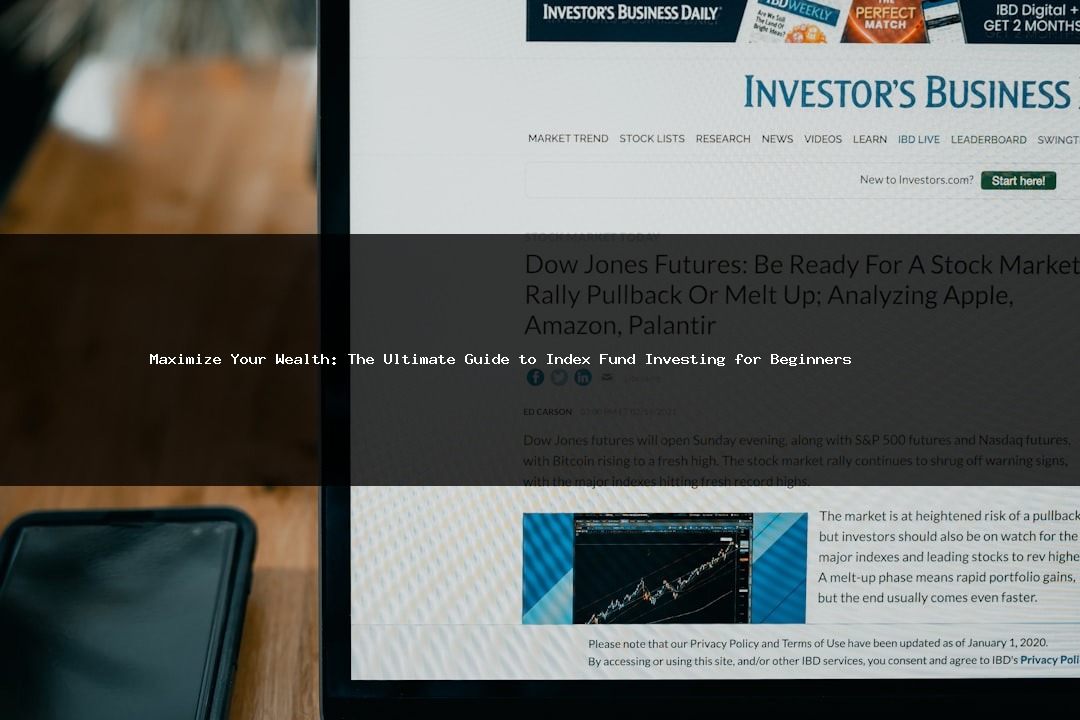Investing can feel overwhelming, especially for beginners who are just starting to navigate the financial landscape. Among the variety of investment options available, index funds have emerged as a popular choice for those looking to build wealth over time. This guide aims to demystify index fund investing, providing you with the knowledge and tools to maximize your wealth effectively.
Understanding Index Fund Investing
What are Index Funds?
Index funds are passively managed investments that aim to match, rather than outperform, the market index they track. This approach contrasts with actively managed funds, where fund managers attempt to beat the market by selecting specific stocks or assets. The passive nature of index funds leads to several advantages:
Lower Costs: Because index funds don’t require active management, they tend to have lower expense ratios compared to actively managed funds.Broad Diversification: By holding all the components of an index, investors benefit from inherent diversification, which reduces the risk associated with investing in individual stocks.Consistent Performance: Historically, index funds have outperformed many actively managed funds over the long term.
How Do Index Funds Work?
When you invest in an index fund, your money is pooled with that of other investors to purchase a diversified set of securities that reflect the index. For example, if you invest in an S&P 500 index fund, your investment will be allocated across the 500 companies included in the index, such as Apple, Microsoft, and Amazon. The fund’s performance will directly correlate with the performance of these companies.
Key Components of Index Fund Investing
To effectively invest in index funds, it’s essential to understand several key components that can influence your investment strategy.
Expense Ratios
The
- Active fund expense ratios can range from 1% to 2% or higher.
- Index fund expense ratios often fall below 0.5%, with many funds offering ratios around 0.1% or less.
Over time, lower expense ratios can significantly enhance your investment returns. For instance, if you invest $10,000 in a fund with a 1% expense ratio versus a fund with a 0.1% expense ratio, the difference in fees can amount to thousands of dollars over several decades.
Tracking Error
Types of Index Funds
Index funds come in various forms, each catering to different investment goals. Here are the most common types:
Broad Market Index Funds: These funds track major indices like the S&P 500 or the total stock market index.Sector-Specific Index Funds: These focus on specific sectors, such as technology, healthcare, or real estate.International Index Funds: These funds provide exposure to foreign markets, diversifying your investment portfolio.
Benefits and Importance of Index Fund Investing
Investing in index funds offers numerous advantages that can contribute to long-term wealth maximization.
Simplicity
One of the most appealing aspects of index funds is their
Long-Term Growth Potential
Historically, the stock market has shown a tendency to increase in value over the long term. By investing in index funds, you can take advantage of this
Tax Efficiency
Index funds are often more tax-efficient than actively managed funds. Due to their passive management style, they typically have lower turnover rates, which means fewer taxable capital gains distributions. This can lead to a more favorable tax situation for investors, allowing them to keep more of their returns.
Accessibility
Index funds are widely available through various investment platforms, including brokerage accounts and retirement accounts like IRAs and 401(k)s. This accessibility makes it easy for investors of all levels to incorporate index funds into their portfolios.
Practical Applications
Now that you understand the fundamentals of index fund investing, let’s explore practical applications that can help you get started.
Establishing an Investment Strategy
Before diving into index fund investing, it’s crucial to establish a clear
Define Your Goals: Are you investing for retirement, a major purchase, or simply to grow your wealth? Having clear goals will guide your investment choices.Determine Your Risk Tolerance: Understand how much risk you are willing to take. This will help you decide which types of index funds to invest in.Choose an Investment Account: Decide whether you want to invest through a taxable account or a tax-advantaged retirement account.
Building a Diversified Portfolio
While index funds offer inherent diversification, it’s still essential to create a well-rounded portfolio. Here’s how:
Mix Different Types of Funds: Consider including a mix of broad market index funds, sector-specific funds, and international funds to capture different market segments.Rebalance Regularly: Over time, your portfolio may drift from its target asset allocation due to market fluctuations. Regular rebalancing ensures you maintain your desired risk level.Invest Consistently: Implement a dollar-cost averaging strategy by investing a fixed amount regularly (e.g., monthly), which can reduce the impact of market volatility.
Monitoring Your Investments
Once you’ve invested in index funds, it’s important to monitor your investments periodically. Consider the following:
Review Performance: Regularly check how your index fund investments are performing relative to their benchmark indices.Stay Informed: Keep up with market trends and economic news that may impact your investments.Adjust as Necessary: If your financial goals or risk tolerance change, be prepared to adjust your investments accordingly.
Frequently Asked Questions
What is the difference between an index fund and a mutual fund?
A mutual fund is a pooled investment vehicle that can be actively or passively managed. An index fund, specifically, is a type of mutual fund that is passively managed and designed to replicate the performance of a specific market index. While both offer diversification, index funds typically have lower fees and aim for market-matching performance rather than attempting to outperform the market.
How much money do I need to start investing in index funds?
The amount you need to start investing in index funds varies by fund and brokerage. Some index funds have minimum investment requirements that can range from $1,000 to $3,000. However, many brokerages offer commission-free ETFs with no minimum investment, allowing you to start investing with as little as $100 or even less, depending on the platform.
Are index funds a good investment for retirement?
Yes, index funds are considered an excellent option for retirement investing. They offer diversification, low fees, and the potential for long-term growth. Many retirement accounts, such as 401(k)s and IRAs, provide access to index funds, making them a convenient choice for building a retirement portfolio.
How do I choose the right index fund?
To choose the right index fund, consider the following factors:
Expense Ratio: Look for funds with low expense ratios to maximize your returns.Tracking Error: Choose funds with a low tracking error to ensure they closely follow their benchmark index.Fund Size: Larger funds may have more stability and liquidity, but also consider the fund’s investment strategy and historical performance.
Can I lose money in index funds?
Like all investments in the stock market, index funds carry risks, including the possibility of losing money. Market fluctuations can affect the value of your investment, especially in the short term. However, index funds are designed for long-term investing, and historically, the stock market has trended upward over extended periods. A well-diversified index fund portfolio can help mitigate risks associated with individual stock investments.
What is the best time to invest in index funds?
The best time to invest in index funds is generally as soon as you have the funds available and have established your investment strategy. Timing the market can be challenging, and many investors benefit from a
Conclusion
Index fund investing offers a simple, cost-effective way for beginners to build wealth over time. By understanding the fundamentals, key components, and practical applications of index funds, you can create a diversified investment portfolio that aligns with your financial goals. Remember, successful investing requires patience and a long-term perspective. Start your journey with index funds today, and take the first step toward maximizing your wealth.



